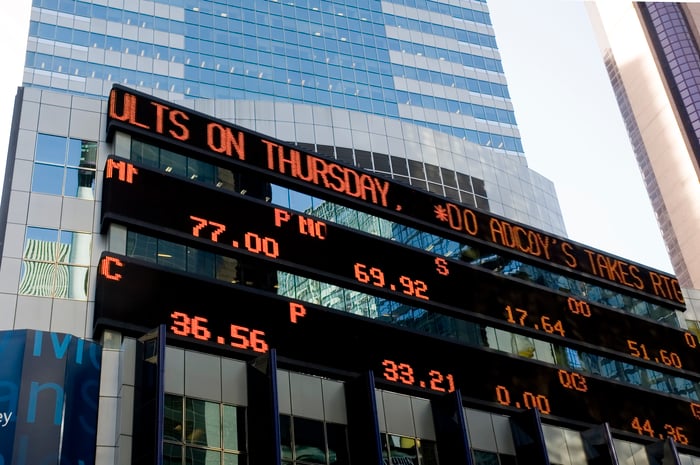For more than a century, the Dow Jones Industrial Average (^DJI 0.06%) has been the most widely followed stock index. What was once a 12-stock index packed with industrial companies in the late 1800s has grown into a 30-component index filled with multinational, time-tested businesses.
When market volatility picks up -- as it has since the year began -- it's not uncommon for successful money managers to seek the safety of the mature stocks that comprise the Dow Jones. Form 13F filings with the Securities and Exchange Commission (SEC) by billionaire money managers show this to be true.
Based on the most recent round of 13F filings in mid-May, it's readily apparent that billionaires couldn't stop buying the following five Dow stocks.

Image source: Getty Images.
Chevron
The first Dow component that saw incredible amounts of billionaire buying activity in the first quarter is oil and gas giant Chevron (CVX 0.75%). Billionaire Warren Buffett of Berkshire Hathaway oversaw the addition of nearly 121 million shares of Chevron during the first three months of the year.
Aside from Chevron's market-trouncing dividend yield of 3.8%, Buffett's recent fascination with integrated oil and gas stocks likely has to do with the expectation that energy commodity prices will remain elevated for years. The COVID-19 pandemic reduced drilling investments domestically, and Russia's invasion of Ukraine has further complicated the global energy supply chain. With no easy remedies to generate additional supply, higher prices for crude oil and natural gas should benefit Chevron's upstream assets.
However, Chevron's integrated operating model is appealing to investors like Warren Buffett as well. Though drilling nets Chevron its juiciest gross profits, the company also owns and operates midstream (e.g., transmission pipelines and storage) and downstream (e.g., refineries and chemical plants) assets. If the price of oil and/or natural gas weakens, Chevron can lean on the cash flow predictability of its midstream and downstream operations.
JPMorgan Chase
Bank stocks are usually avoided during steep corrections and bear markets. But billionaires John Overdeck and David Siegel of Two Sigma Investments apparently didn't get that memo. Two Sigma added nearly 1.44 million shares of JPMorgan Chase (JPM 0.65%) during the first quarter, which increased its stake by more than 900%, compared to the end of 2021.
Two Sigma's interest in JPMorgan Chase may well have to do with the Fed's monetary policy shift. Never before has the nation's central bank been forced to aggressively raise interest rates into a falling stock market. But in order to bring historically high inflation under control, the Federal Reserve has little choice but to be hawkish. For banks like JPMorgan Chase, it means a sizable uptick in net-interest income from outstanding variable-rate loans.
The other thing to note about money-center banks is that they're able to take advantage of the natural growth of the U.S. economy over time. Though recessions are inevitable, they last for a substantially shorter amount of time than economic expansions. Overdeck and Siegel might simply be placing their chips on a bet that strongly favors patient investors.

Image source: Getty Images.
Salesforce
The fastest-growing stock in the Dow Jones Industrial Average was also a popular billionaire buy. Ken Fisher of Fisher Asset Management oversaw the addition of nearly 670,000 shares of Salesforce (CRM -1.59%) in the first quarter. This increased Fisher Asset Management's take in the company to more than 15.2 million shares.
Salesforce is the world's leading cloud-based customer relationship management (CRM) software solutions provider. According to a report from IDC, Salesforce accounted for 23.8% of worldwide CRM spending in 2021. That's more than No. 2 through No. 5 in CRM market share combined, and it represents the ninth consecutive year Salesforce has been the global top dog in cloud-based CRM software. The point is that its crown won't be taken anytime soon.
Salesforce's success is also a function of co-founder and co-CEO Marc Benioff orchestrating a handful of earnings-accretive acquisitions. Deals such as MuleSoft, Tableau Software, and Slack Technologies have broadened the Salesforce ecosystem and given the company more avenues to cross-sell its solutions. Per Benioff, Salesforce is on track to nearly double its annual revenue to at least $50 billion in four years.
Procter & Gamble
Yet another Dow component that was on the radar of at least one well-known billionaire money manager in the first quarter is consumer staples stock Procter & Gamble (PG 0.86%). Billionaire Ray Dalio of Bridgewater Associates scooped up more than 1.63 million shares of P&G. At the end of March, P&G was Bridgewater's second-largest holding by market value (about $1.04 billion).
The reason Procter & Gamble is such a trusted stock is that it sells a massive assortment of nondiscretionary items, such as detergent, paper towels, toilet paper, and toothpaste. No matter how poor the outlook for the U.S. or global economy, consumers are still going to buy basic necessity personal care and household products. This is what gives P&G such exceptional pricing power.
Procter & Gamble happens to be a king among Dividend Aristocrats as well. In April, the company increased its base annual payout for a 66th consecutive year. Thanks to the transparency of its operating cash flow, P&G is able to aggressively invest in advertising and brand-building without adversely impacting its payout or ongoing product innovation.
Microsoft
The fifth Dow stock that caught the eye of billionaire money managers is tech goliath Microsoft (MSFT -1.84%). Billionaire Jeff Yass of Susquehanna International added approximately 1.16 million shares of Microsoft during the first quarter, which ultimately increased Susquehanna's stake by 55% from the sequential fourth quarter.
From top to bottom, Microsoft is an absolute cash cow. For instance, even though its legacy Windows segment isn't growing anywhere near as fast as it was two decades ago, Windows is still far and away the leading operating systems for desktops worldwide. Even if growth were to stagnate in this segment, the exceptionally high margins Microsoft enjoys from Windows can generate copious amount of cash flow that the company can deploy for higher-growth initiatives, share buybacks, or to pay dividends.
Aside from the nearly $105 billion in cash, cash equivalents, and short-term investments on its balance sheet, Microsoft's allure is its sustained double-digit growth rate, which is no small feat for a company of its size ($2 trillion market cap). This rapid growth is a reflection of Microsoft's cloud investments paying off. Azure is the global No. 2 in cloud infrastructure spending, and it grew sales by nearly 50% in the latest quarter.





